by Elizabeth Grams
Photos: Rob Bolka, Lisa Ficker, Peter Hermes Furian, Glenn Rymsza, Shutterstock
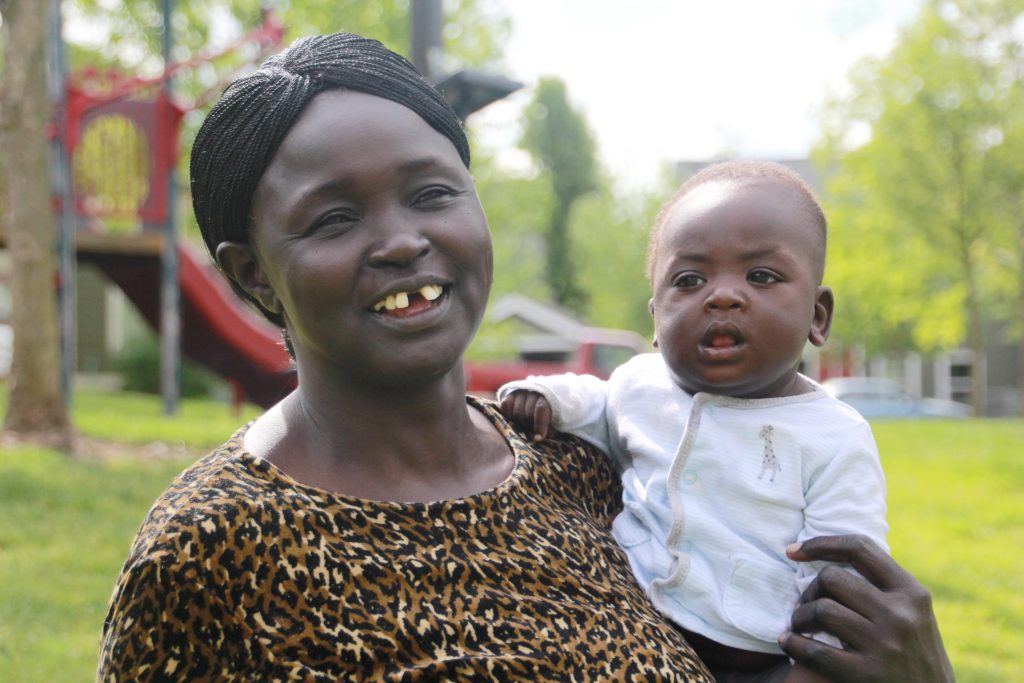 Deborah Mayom, a survivor of civil war in Sudan and a Trinity Academy parent, with her grandson outside her home in Portland.
Deborah Mayom, a survivor of civil war in Sudan and a Trinity Academy parent, with her grandson outside her home in Portland.My name Deborah. I love my name. I try to be strong lady like Deborah in Bible. I go five days no food, I not die. Too many bullets coming, they didn’t hit me. I drink urine, I not die. I think my name is very, very strong.
Deborah Mayom is a mother of eight children, a survivor of the long and brutal civil war in the African nation of Sudan, an immigrant to the US and, most importantly to her, a woman of prayer. Last year, through circumstances that can only be attributed to the Holy Spirit, she became something else, something she never expected to be growing up in a war zone—a Trinity Academy parent.
Walking out of Little Caesar’s Pizza in North Portland in August, 2015, she spotted a sign for Trinity Academy, a school sponsored by the Vancouver-Portland branch. She went inside, met Jo Clark, the head of school, and explained that her daughter Nyibol (NEE-ih-bull) was bright and ready for eighth grade. Deborah liked the fact that the school was Christian, but she knew she didn’t have enough money to pay for tuition. Jo, sensing the Spirit’s prompting, told her to come back the next day with Nyibol.
Deborah returned the next day, bringing Nyibol, and Jo brought her daughter Addie—also 13 and ready for eighth grade. Deborah, who has a large gap between her front teeth, saw Addie’s braces and said, “I like your smile!” Later that day, Jo shared what she knew of Deborah’s story with Charlie Fraga, who leads the school’s board. Though Trinity Academy had already given out all of the financial aid money in their budget for the year, they agreed to admit Nyibol. A few months later, a benefactor heard the story and decided to make a donation that more than paid for her tuition.
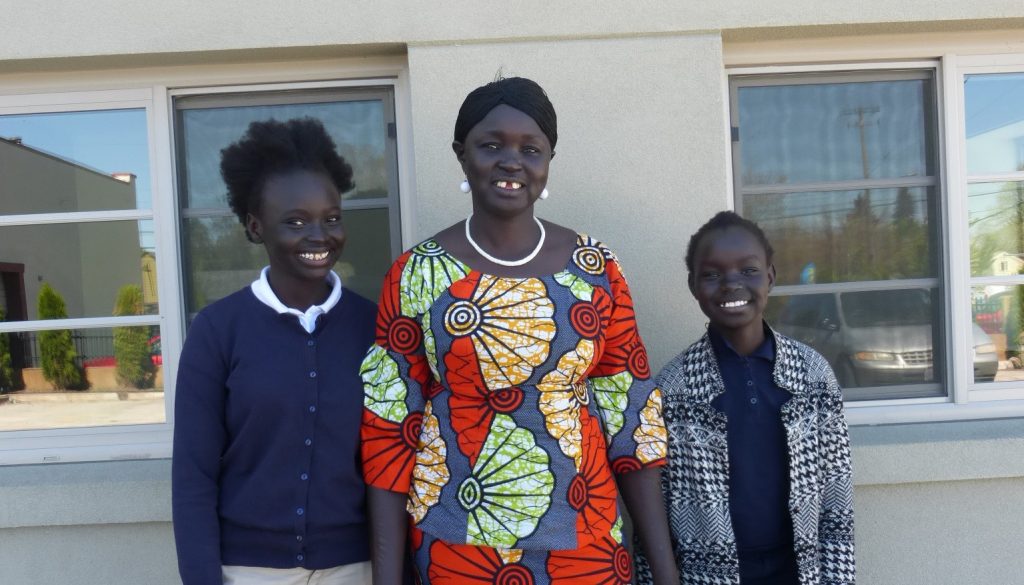 Deborah and two of her daughters: Nyibol, who just completed the eighth grade at Trinity Academy, and Abul, who will start in sixth grade this fall.
Deborah and two of her daughters: Nyibol, who just completed the eighth grade at Trinity Academy, and Abul, who will start in sixth grade this fall.Deborah speaks five languages: Dinka, Nuer, Swahili, Arabic and English. Her English is rudimentary, but her speech has an unmistakable rhythm and her words are lyrical. Like the psalmists of old, she tells of being poor, threatened and on the run, of facing death while surrounded by enemies on every side, of deliverance at the hands of the living God. “I shall not die, but live to proclaim what the Lord has done”—these ancient words are as real for her as they were for King David and his men.
In telling Deborah’s story, I have tried to include many of her own words. As with the Psalms, they reveal her soul and the soul of her people.
. . .
The country of Sudan, located in northeast Africa near Egypt and Ethiopia, has a history not unlike that of Palestine, the homeland of Deborah’s biblical namesake. After centuries of domination by one empire or another, including Egypt and Great Britain, Sudan achieved independence in 1956, then plunged into civil war. The war pitted the heavily Arab and Muslim northerners, who dominated the government, against the people of the agricultural and pastoral south, where much of the country’s rich oil resources lay. In the south, where Deborah grew up, the population includes Christians and followers of traditional African religions.
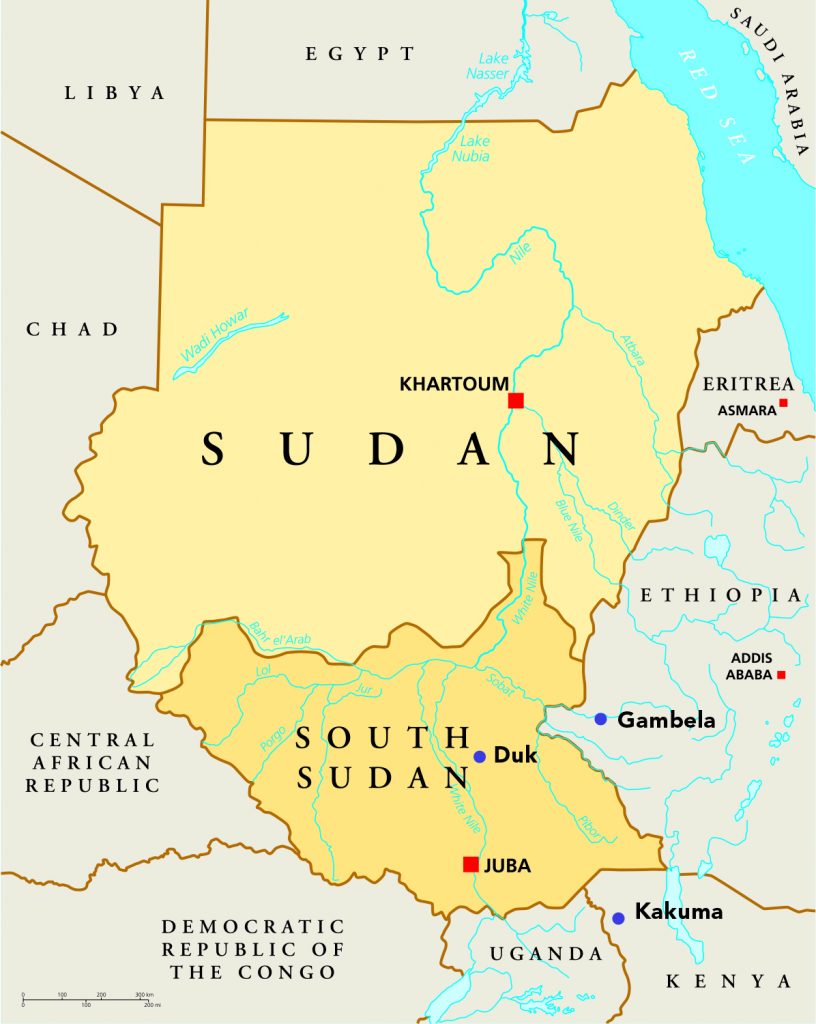 Map: When Deborah fled Sudan, she went from Duk (now part of the new country of South Sudan) to the Gambela Region of Ethiopia. Later, she came to a refugee camp in Kakuma, Kenya, the closest thing to a home her children ever had before coming to the US.
Map: When Deborah fled Sudan, she went from Duk (now part of the new country of South Sudan) to the Gambela Region of Ethiopia. Later, she came to a refugee camp in Kakuma, Kenya, the closest thing to a home her children ever had before coming to the US.Deborah was born in 1974 to a Christian family in the village of Duk, during a temporary and tenuous peace.
Duk is small village. We take care of animals like cow, like goat, like lamb. We don’t have clothes, no shoes. We don’t know what shoes mean! When I’m a child, I don’t know nothing. I learn by soil. I learn by animal. I don’t learn by pen—write something down—never! I learn by hand.
I grew up going to church: my father and my mother, they brought me. We pray.
In 1983, the government imposed Islamic Sharia law on the entire country, including the non-Muslim south. The government ordered the transfer of southern Sudanese soldiers to the north, far from their families. The soldiers rebelled and war once again swept through Sudan.
In Deborah’s home area, government soldiers burned down villages and dropped bombs from the air. Deborah told me that her father was killed by gunfire from a helicopter during a raid. Later, when her village was attacked, she became separated from her mother and the rest of her family.
Muslim people shoot my church. Those people kill my dad immediately. They take our house. And then we run away. I separate from my mom. They shoot at us, and then we run away. Tomorrow, another place. Tomorrow, another place. Walk, walk, walk.
Not knowing whether her mother, brother and sister were still alive, Deborah headed east along with many other refugees, hiding alone or with small groups in the bushes to avoid getting caught by the soldiers. She trekked through river wetlands and across deserts, eventually reaching Ethiopia. There, she took up residence with thousands of other Sudanese in a camp with minimal shelter, poor sanitation and barely enough food for survival. Cholera and other diseases were rampant.
While in Ethiopia, she met a soldier with the Sudan People’s Liberation Army, which had formed after the imposition of Sharia in 1983 and had established training camps in Ethiopia. She married him in 1990. Deborah was 16—a normal age for a woman to marry in Sudan.
A year later the Ethiopian government was taken over by a new party which was friendly to the government of Sudan. The new Ethiopian regime expelled the Sudanese refugees and soldiers from the camps. At the Gilo River, while a group of refugees waited to be ferried across, Ethiopian soldiers trained their fire on the crowd, many of them children.
Ethiopia people, they shooting us. Yes, they shooting us! We die. We go to river, they shoot at us in the river. They shoot us, they shoot us. In river there is too much water, but we don’t know swim. And then, people go in the water, and then drown.
John Bul Dau, an eyewitness, said in a memoir, Lost Boy, Lost Girl, that hundreds died while trying to cross the Gilo, from bullets, crocodiles or drowning. But Deborah, carrying her oldest daughter, had made it over on a ferry before the shooting started. She reentered Sudan, where the war raged on. For many months, she travelled in and out of southern Sudan, moving on when fighting or air raids came close, walking sometimes for months at a time in and through a broad border region that includes parts of Uganda, Ethiopia and Kenya. Sometimes she ate food from trash heaps.
In 1992 Deborah came to Kakuma, a United Nations camp in northern Kenya which hosted tens of thousands of Sudanese refugees. Though she continued to make journeys to visit her husband, who was still fighting in southern Sudan, she and her growing number of children were based in Kakuma for almost 18 years. For the Mayom family and most inhabitants of the camp in the ’90s and early 2000s, food, clothing, medical provisions and jobs were scarce. The refugees were not allowed to seek employment outside of the camp. Deborah used to bake little donuts that she would sell to other refugees, using the profits to buy clothes for her children. Nyibol remembers going to school, learning to read and write primarily in Swahili rather than in her native Dinka language.
While at Kakuma, one of Deborah’s children died suddenly from a mysterious illness.
My son David, he got fever, and then after two day, no energy. My son die. He’s a big boy, 13 years. After that, I pray. I pray God to make me come to America.
By 2005, much of the war in Sudan had ended, and a peace process had begun which ultimately led to the creation of the new independent country of South Sudan. But the prospect of returning to Sudan from Kenya did not look good for Deborah and her children. There was still scattered fighting in the south, primarily among tribes who had been stripped of much of the cattle and farmlands they had depended on for their livelihoods. Also, Deborah’s husband had taken several other wives by this time (a common practice in South Sudan), and she says he did not provide financial support for her and her children. She petitioned the US government for asylum.
While she waited, her brother James came to see her. He had left Sudan at age seven, one of thousands known as “lost boys,” too young to fight but old enough to run. Like Deborah, he had made his way to Ethiopia, but had already been given asylum by the US in the early 2000s. He had been trained as an X-ray technician and in 2005 had returned to Sudan to help rebuild the south. James tracked down his sister and went to see her at Kakuma, their first visit since the mid-1980s. He told her he’d been to Duk, where there was nothing left. “You can’t even find the foundation of the houses. The war burnt down everything.”
In 2010, after four years of waiting, the US granted Deborah’s petition for asylum. She flew to a new world in Portland with her seven children. When they arrived, none of them knew the language. Catholic Charities gave them a few months of financial support and an orientation.
Sue Edwards, a veteran volunteer with World Relief Services who befriended Deborah in Portland, spoke about the challenges refugees like the Mayoms face: “They usually have a day or two to get ready, then hop onto a plane. The government of their new country connects them with an organization like Catholic Charities or World Relief or Lutheran Immigration and Refugee Service, which takes care of them for about a week. They set them up in an apartment for three months and then they’re kind of on their own. The kids often get bullied—other kids don’t understand why they are so dark and don’t speak the language.”
I got here. It’s a good place. And in the morning, I’m looking at my window. I saw church. I say, yes. I’m going now. My kids say, you don’t know English! I say, not about language. We go to pray. And then, we go to church. And that pastor welcome us.
Nyibol remembers being surprised at how similar Portland seemed to Nairobi, Kenya, where she’d been before. “I was confused—I thought it would be different. People in Africa thought that robots do everything for you in the US. We thought we weren’t going to need our clothes because every day we’d wake up and find something new that the robots made for us.”
Deborah had to learn how to lock a door, drive a car, use a shower and a refrigerator. Members of Glenfair Evangelical Church, who had first welcomed her and where she became a member, helped her with laundry and childcare in those first few months. Sue helped her learn how to drive and showed her how to cook a turkey, but Deborah is still leery of the oven.
Six years after coming to the US, Deborah is more settled, but her life is not easy. She works all afternoon and half the night in a low-paying job packaging food and cleaning at a bakery, regularly sending money back to relatives in Africa, including her mother, whom Deborah had learned was still alive. After only a few hours’ sleep, she gets her children ready and out the door for school. Before Deborah heads to work, she studies and goes to a local community college to continue learning English. She spends much of her day off cooking food for the family to last the week.
I’m working now. It’s a good job. Because before, I pray, I say, God, give me a good place. Because I love communicate. I love people. When some people look us, maybe they say, I look like someone not take shower. We strangers, you know. When we come here, and someone do that, I’m not sad, because they don’t know how to do. Right now I been for four years in that place; they know Deborah is a human being.
Nyibol has taken quickly to life at Trinity Academy. Perhaps unsurprisingly, she is an especially quick study in Latin, her sixth language. She played on the school’s first junior high basketball team. Pat and Jo Clark often drive her home from school, since she lives near their home and Deborah works a late shift at her bakery job. Deborah often visits the school early in the day, bringing huge bags of day-old bread and pastries from the bakery, delivering them to students and faculty. She has registered her 11-year-old daughter Abul to enter Trinity Academy’s sixth grade in the fall of 2016.
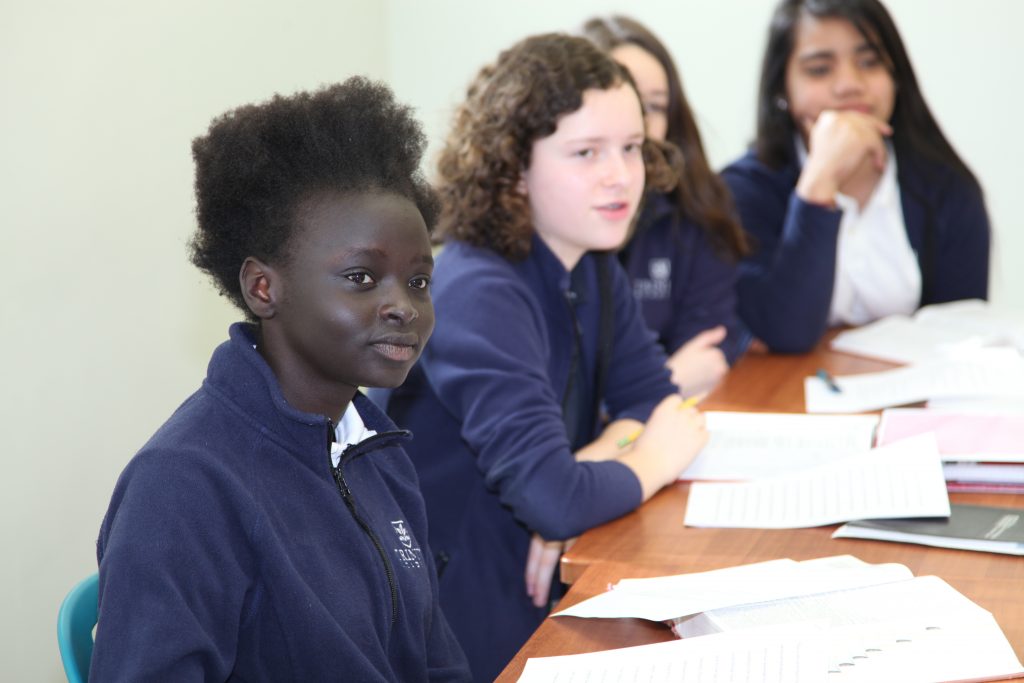 Nyibol, who first learned to read and write in Swahili, enjoys learning with fellow Trinity Academy eighth graders (from left) Addie, Ava and Agapena.
Nyibol, who first learned to read and write in Swahili, enjoys learning with fellow Trinity Academy eighth graders (from left) Addie, Ava and Agapena.“Nyibol is really bright and hardworking,” says Jo. “Students were learning calligraphy in their art class and taking Latin at the beginning of the year. Nyibol loves both of those things. At one point she wrote a poem, and she went to her Latin teacher and asked if she would help her translate it into Latin. Then she wrote it out in calligraphy, and came to show me and her art teacher.”
Nyibol, she love Trinity. She love teachers, she love students. Trinity is very, very, very good to Nyibol. Me, too, I love Trinity. They pray first, and then they go to class. I love that. Dr. Clark is very, very good lady. She put her life to Bible. God first, and things second. Dr. Clark works for God. She don’t work for things. Dr. Clark comes to clean all the tables, after the students are gone. She have a good family.
Deborah lives with five of her children in a simple Portland townhouse. (Two of the children have grown and moved out.) A clay cross decorated with beads and purple paint hangs over their door. Her neat sitting room has a display of family photos from Africa and plaques bearing Christian poems and old-fashioned pictures of Jesus. Lower on the wall hangs the handwritten poem Nyibol wrote at Trinity. Each seat on the sofas is covered with doilies Deborah embroidered with flowers. A framed photo of Deborah’s husband dressed in army fatigues stands in a prominent spot on the credenza.
She talks to me about prayer:
To my kid, I say to pray, to ask God everything. You don’t have nothing? Ask God to give to you. God, there is big hand. God, there is big eye. God, there is big ear. Before, my father and my mom told me, don’t forget to pray. I didn’t forget to pray up to now. Because God hearing good. God looking good. God listening good.
At one point, she pulled down the purple cross from above the doorway and held it in her hand, showing how she would carry it high in front of her in Africa when she walked through the bush or when she prayed at church.
Because we don’t, we don’t forgot a cross. Because we die about a cross. We die forever about that cross. That song . . . It say, we die about Jesus. They say, you die, Jesus, about us. You go to cross about us.
She showed me how she kneels in front of a statue of Joseph and Mary and Jesus in the manger every day in the morning to pray. She kissed them all several times with affection and reverence. Here was another poor family who had to run for their lives into a foreign land. Here was another mother who lost a child. Here was another child in whom the parents placed their hope for a greater future.
I’m poor. But I’m not thinking about it. I have food today, because God change life. Right now, I thank God. Because God working at night, working in the morning, every day. I know Jesus live with me. Lives with everybody. I go to backyard, he’s there. I walking in the street, he’s there. Everywhere.

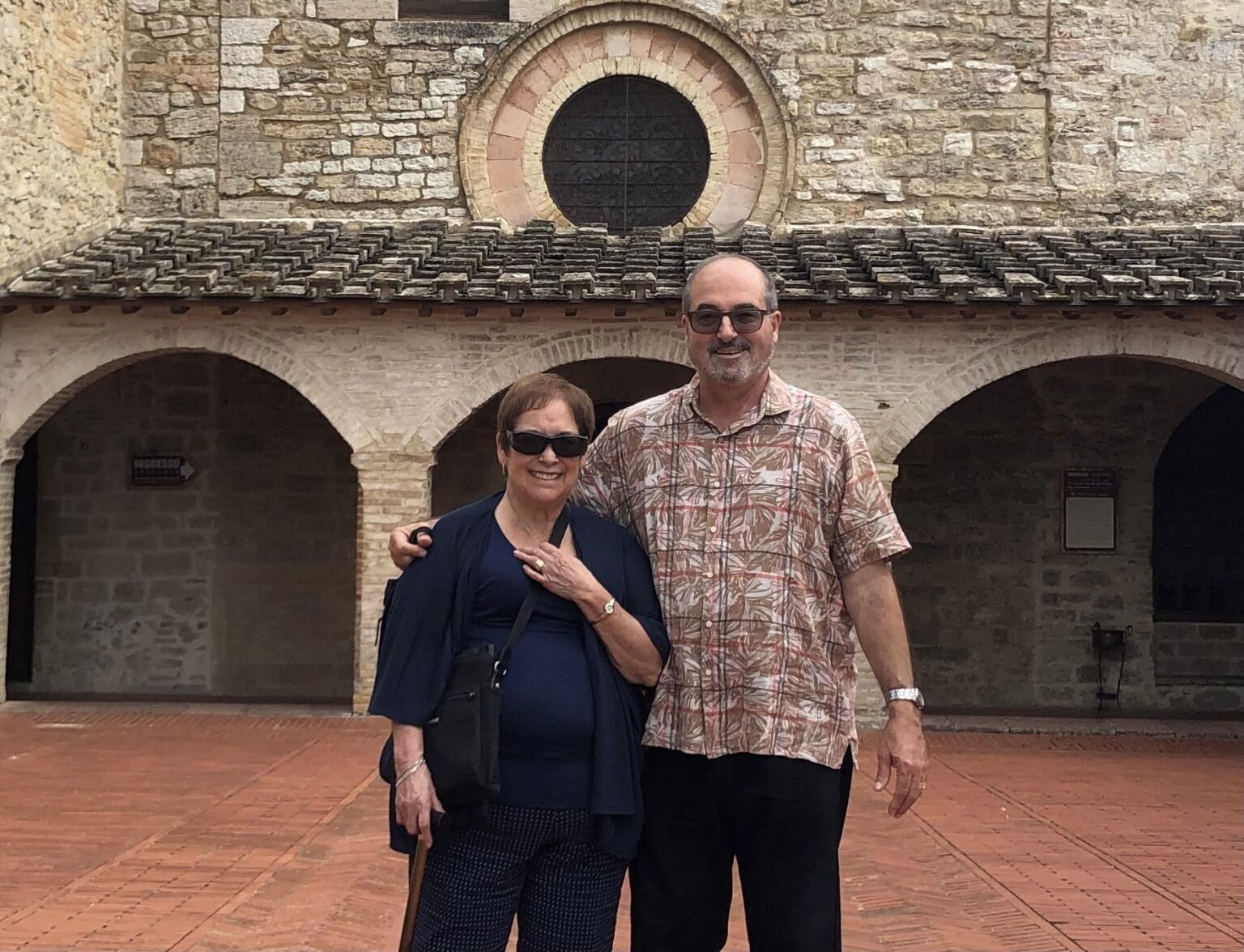
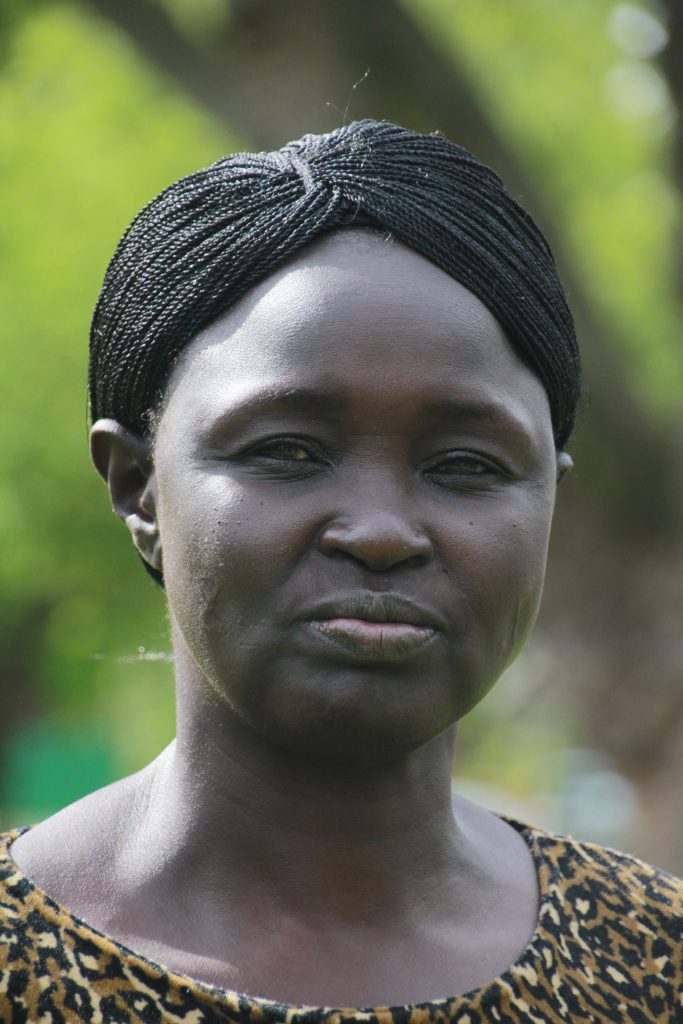
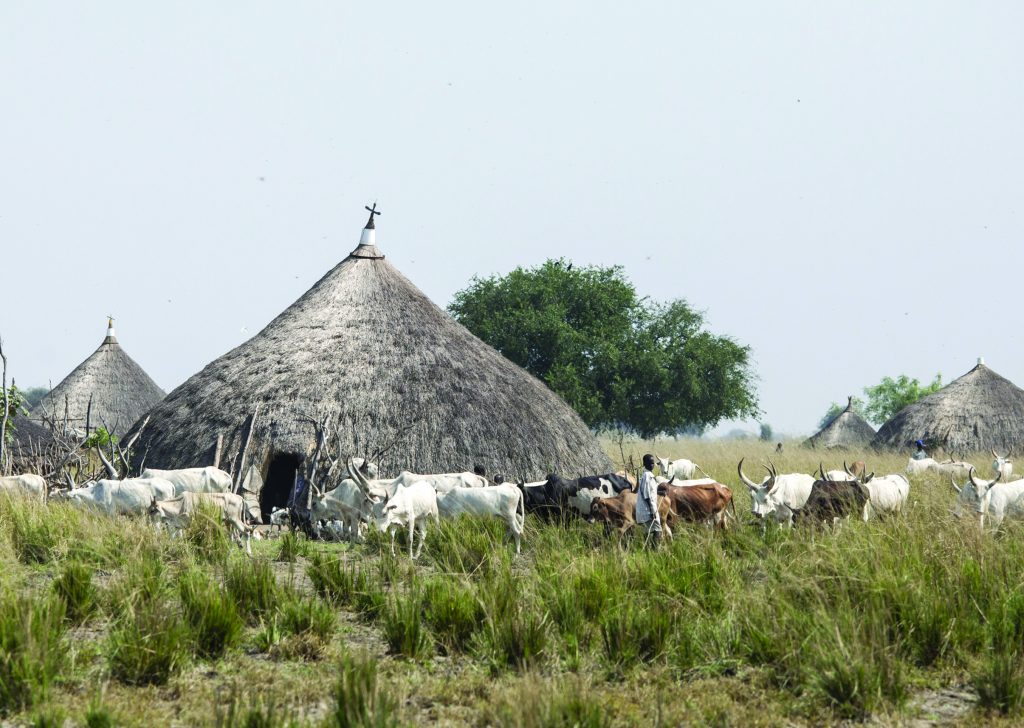
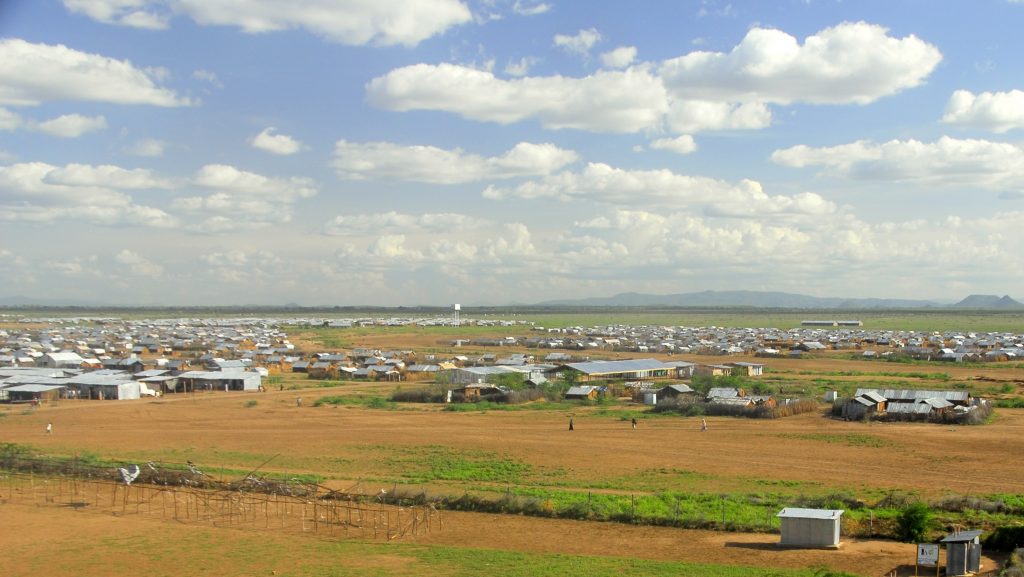
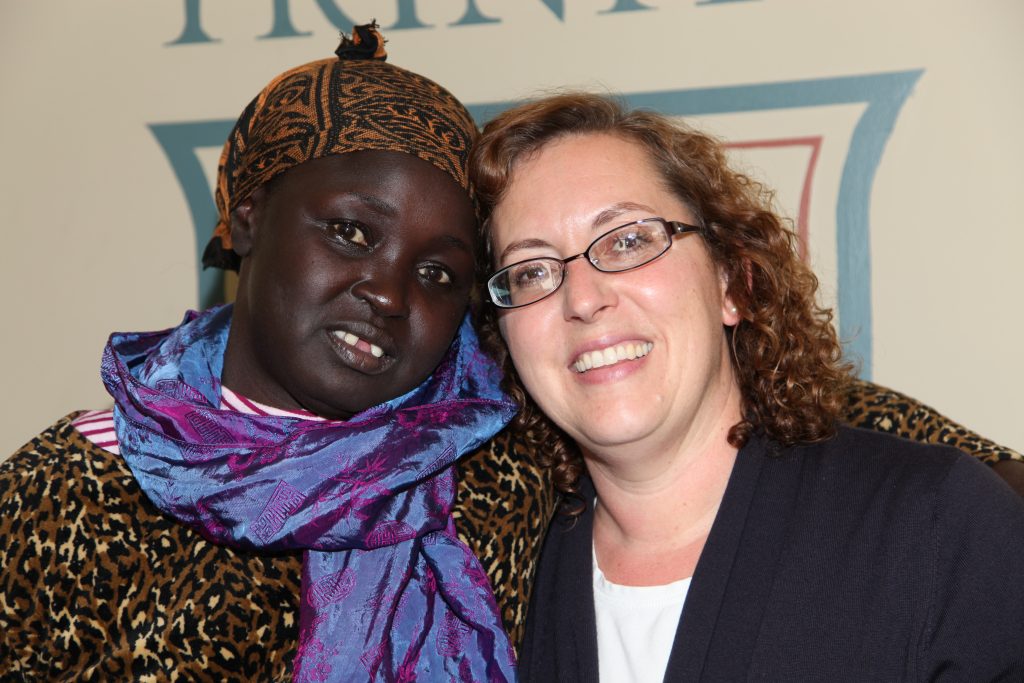
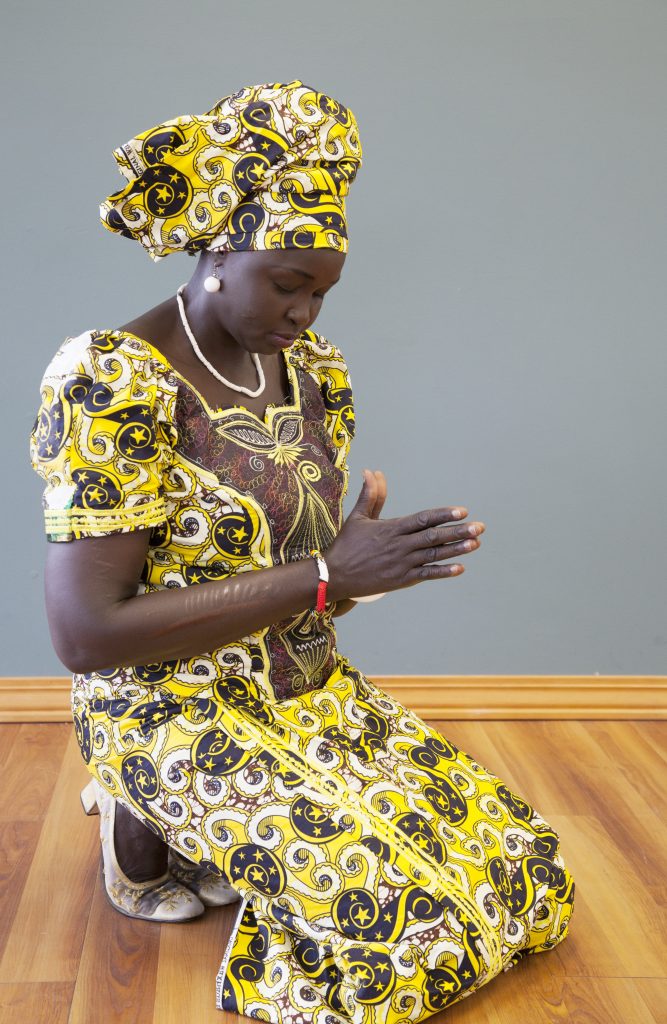
Responses
Mary Clare Luckjohn says:
August 3rd, 2016 at 1:39 PM
Beautiful story. And very inspiring. Thank you, Deborah, for great Christian witness! I can only hope to one day understand the cross and love of God as well as you do.
Joe Gleason says:
August 3rd, 2016 at 3:23 PM
Incredible story. Beautifully written. Glory to God.
Gina Kadera says:
August 4th, 2016 at 12:37 PM
Thank you Deborah for sharing your story. You are truly a strong and beautiful woman of God. Looking forward to knowing you and your family better.
Gina Kadera
Becca Brophy says:
August 6th, 2020 at 3:51 PM
So wonderful. What a strong, holy woman.
Carolyn Reinhardt says:
August 6th, 2020 at 3:56 PM
What a beautiful woman with a strong faith! Thank you for sharing this story and thank you, Deborah, for your faith in Jesus through the years. What a witness!
Tom M Caneff says:
August 6th, 2020 at 3:57 PM
Deeply moving and inspirational. Thanks! Praying for Portland these days.
Mike Hass says:
August 6th, 2020 at 4:13 PM
I think of the pandemic we are going through right now. What will we be like after we get through this change in our lifestyle? Hopefully stronger in faith like Deborah. Stronger in faith is my prayer. GOD Bless you Deborah.
Mary L Louise Duddy says:
August 6th, 2020 at 4:52 PM
I love this story
Joan McLeod says:
August 6th, 2020 at 5:58 PM
Glory to God! Thank you for your love and dedication to the Lord and your family, Deborah! I am so proud of you and the many obstacles you have already overcome. God has a plan for you and your children. I pray for you, your future and your family. Sending love from Minnesota!
?
Wil Juare says:
August 6th, 2020 at 7:17 PM
What a beautiful witness to the love of God for and her family. Thank God the Holy Spirit stepped in to help by using willing hearts.
Rita Kottkamp says:
August 7th, 2020 at 9:20 AM
A beautiful woman and a beautiful story of powerful faith. If we were having Charismatic conferences, I would want her to stand and tell her story. We all need to have such faith. I am grateful for all those people who saw her need and blessed her. I am grateful for the donor who made it possible for her children to attend Trinity Academy. I am grateful to Jo Clark bringing her daughter to meet Deborah's daughter. That too, was loving and generous. God chooses simple people to confound the wise. Deborah is a strong woman from a simple life. She is a witness to many. Thank you for this story. It is moving and faith-building.
Karen Heintzelman says:
August 7th, 2020 at 9:54 AM
Deborah, thank you for showing us your great faith and love! May God continue to bless your beautiful family!
Diane Ridenour says:
August 7th, 2020 at 9:00 PM
Deborah , your story is so inspiring! What great trust in following the Lord on the Cross and in the freedom it promises! May Our Lord continue to bless you and use you and your family in making Him more greatly known and loved in the world!
Bernadette Fossen says:
August 10th, 2020 at 6:03 PM
Deborah has gratitude and strong faith.
Leave a Response